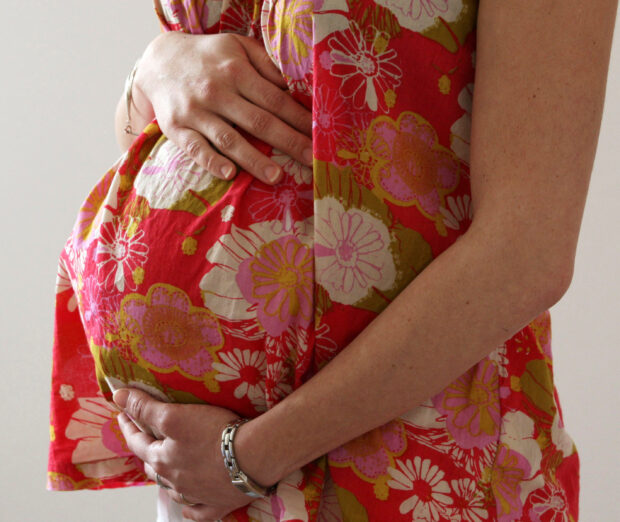
A woman holds her stomach at the last stages of her pregnancy in Bordeaux April 28, 2010. REUTERS FILE PHOTO
PARIS — French President Emmanuel Macron promised on Tuesday to overhaul parental leave so it pays better after France saw the lowest number of births since World War Two last year, in a blow to its traditionally strong demographic profile.
France registered 678,000 births last year, representing a decrease of 7% from 2022 and down 20% since peaking in 2020, INSEE said in its annual census report.
The country has for decades been an outlier compared to other European countries, avoiding a collapse in birth rates as seen in Germany, Italy and Spain.
Demographers have traditionally put this down to France’s generous health and childcare system as well as tax breaks and other benefits for having children, especially three or more.
READ: France to give free access to contraception for women aged up to 25
That has helped soften the impact of an aging population while contributing to the country’s long-term growth prospects, which economists say are generally determined by demographics, productivity gains and labour force participation.
“France will only be stronger if it revives the birth rate,” Macron said during a wide-ranging news conference.
“A new, better paid parental leave will allow both parents to be with their children for six months if they want,” he added.
In addition to basic maternity leave, French parents can currently take additional parental leave for one year with the possibly of renewing twice.
However, it only pays slightly more than 400 euros ($435) per month, which Macron said was a source of anxiety for some parents. He said it also cut mothers off from the labour market too long.
INSEE said the average number of children per mother fell last year to a three-decade low of 1.68 from 1.79 in 2022. In 2021, France had the highest birth rate in the European Union along with the Czech Republic at 1.83, the last year for which comparative figures are available.
Not only is the 2023 figure below the 2.2 generally considered to be necessary to maintain population levels in developed countries, it is also below the 1.8 births estimate that underpinned a deeply contested 2023 retirement reform.
That could mean that if the birth rate stays at 2023 levels the reform will not reduce the pension deficit as planned.
However, a recovery in the birth rate in the coming years is possible as people born in 2000-2010 – a period of high births – themselves begin to have children, researchers at the Institut National d’Etudes Demographiques said in a note.
While people are having fewer children, pro-family Unis pour les Familles association says that the decline does not mean people want fewer children but rather conditions are not necessarily good.
In an Opinionway poll of 11,000 people for the association, two-thirds who did not have children said that they wanted to while one out of five parents said they would have liked more children.
The most common reasons people gave for not having more children were concerns about the economic, social and climatic outlook, cited by 30% of those polled. Some 28% said raising children cost too much.
The successive crises over the COVID-19 outbreak, surging energy prices and record inflation have taken a heavy toll on household confidence, which has struggled to recover from record lows reached in mid 2022, according to INSEE’s monthly survey.
($1 = 0.9194 euros)